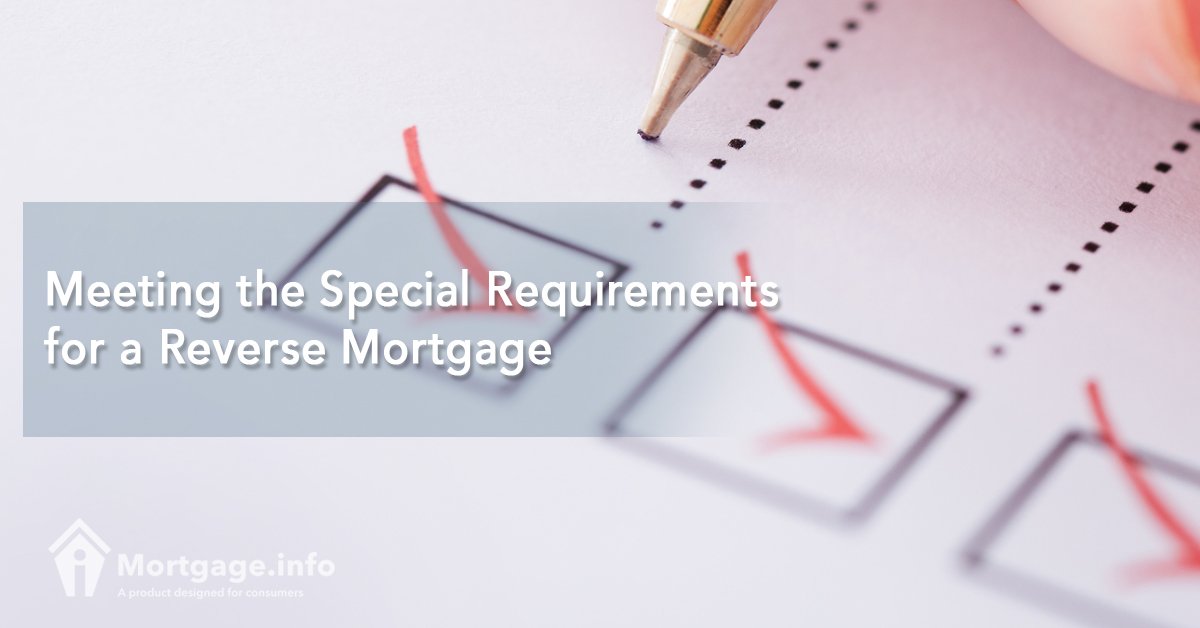The reverse mortgage offers senior borrowers to tap into the equity of their home. The loan program, also known as the Home Equity Conversion Mortgage, works differently than a standard home equity loan. Many seniors use this opportunity to have supplemental income when their social security does not cover their expenses or allow them to live comfortably. However, there are some special requirements you must meet in order to qualify.
Understanding the Reverse Mortgage
It helps to understand how the reverse mortgage works. It is available to senior citizens with equity in their home. You are able to borrow the equity in form of a reverse mortgage. Unlike a standard home equity loan, you do not have to make monthly payments. Instead, the principal balance plus any accrued interest is due upon sale of the home. This enables senior citizens to enjoy the equity they accrued in their investment throughout the years.
The Reverse Mortgage Special Requirements
There are many special requirements you must meet in order to be able to obtain the equity of your home without requiring any payments:
- You must be at least 62 years old
- If you are married, the age of the youngest spouse determines your eligibility
- You must own the home without any liens on it
- If you do have a lien, the balance must be low and can be paid off with the proceeds of the reverse mortgage
- You must have the ability to maintain the home including paying the real estate taxes and homeowner’s insurance premiums
- It must be your primary residence
- The home must be a single-family home or a 2-4 unit in which you occupy one of the units
How Much Can you Borrow?
The rules regarding how much money you can borrow with a Reverse Mortgage depends on your age. The amount you can receive goes up the older you are when you apply for the mortgage. For example, a 62-year-old borrower would receive less than a 75-year old borrower. This is because the life expectancy of a 75-year old is shorter than a 62-year old. This means the bank has to lend the money out for a shorter amount of time for a 75-year old. This means a lower risk of default.
Receiving the Payments
There are several ways you can receive the payments on a Reverse Mortgage. If you opt for a fixed rate term, you receive one lump sum payment. You are then free to invest or use the money as you see fit. If you take an adjustable rate term, however, you can choose among different methods to receive your money. The options include:
- Equal payments on a monthly basis for a predetermined length of time
- Equal payments on a monthly basis as long as the borrower is alive or living in the home
- In an account that serves as a line of credit where you determine when you receive payments either on a consistent or sporadic basis
You are free to determine how you receive the payments based on your needs. It will play a role in the interest rate you receive on the loan, though.
Adequate Equity in the Home
The final requirement is having adequate equity in the home. If you do not have any liens on the home at the time of application, this does not play as important of a role as it would if you had a lien. If there is a mortgage on the home, it must be paid off first. This means the proceeds from the Reverse Mortgage first go to the mortgage. If the equity you have in the home does not cover the lien plus any proceeds, you may not qualify or it might not be worth it for you to take it out. This is called a “shortfall” and can be discussed with your lender to see if it makes sense for you to take the money out of your home.
Determining if it makes sense to take out a reverse mortgage depends on many factors. How long do you plan to stay in the home? What is your age? What is your health like? Remember, once you are not around any longer, the people in charge of your estate must pay the loan off. They cannot sell the home and take the proceeds without paying off the lien first. It is not just the principal amount you borrow that they must pay off either; they must also pay any interest and accrued fees. If the value of your home drops, this could leave your relatives with no money upon the sale of your home.
What will you use the funds from the Reverse Mortgage to pay? Do you need daily living expenses? If this is the case, can you afford the taxes and insurance on the property? If not, you might not meet the special requirements of the loan program. You must be able to comfortably afford the taxes and insurance. In addition, you need to consider how you want to receive the payments. Do you need a large sum of money now? Or do you want the money in an account where you can take it out as needed? Consulting with a few lenders regarding the Reverse Mortgage can help you determine the right choice for you.

